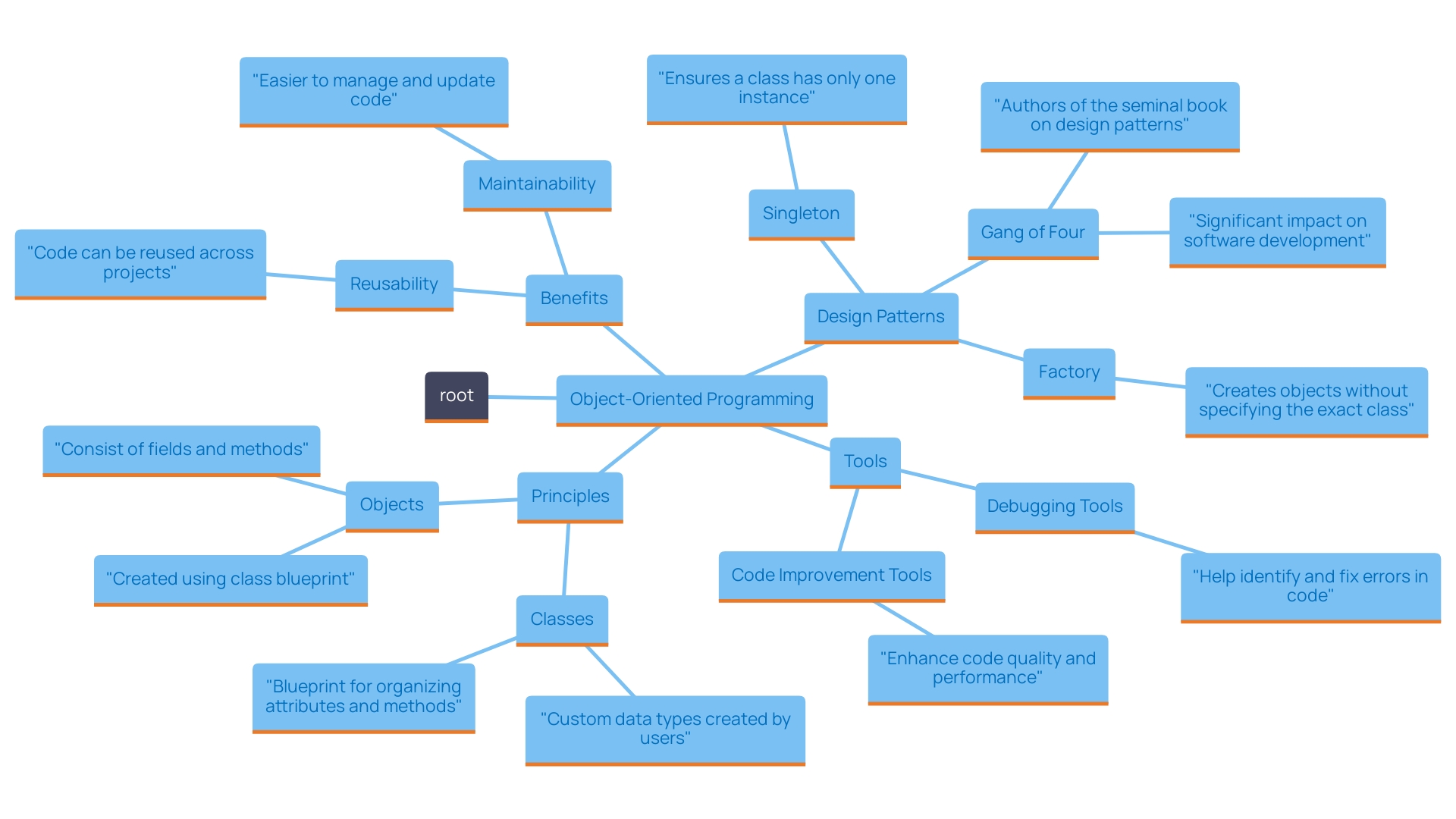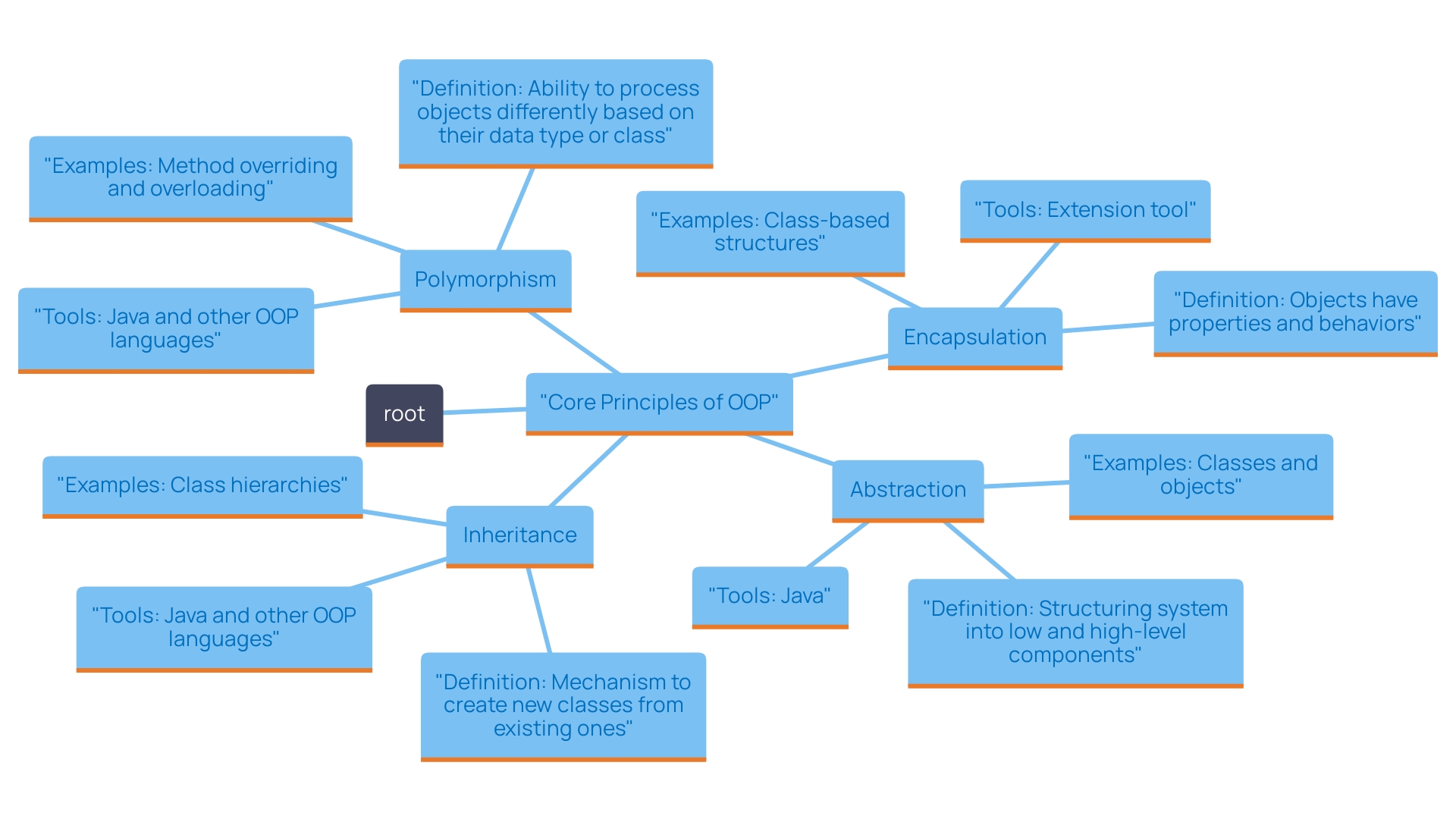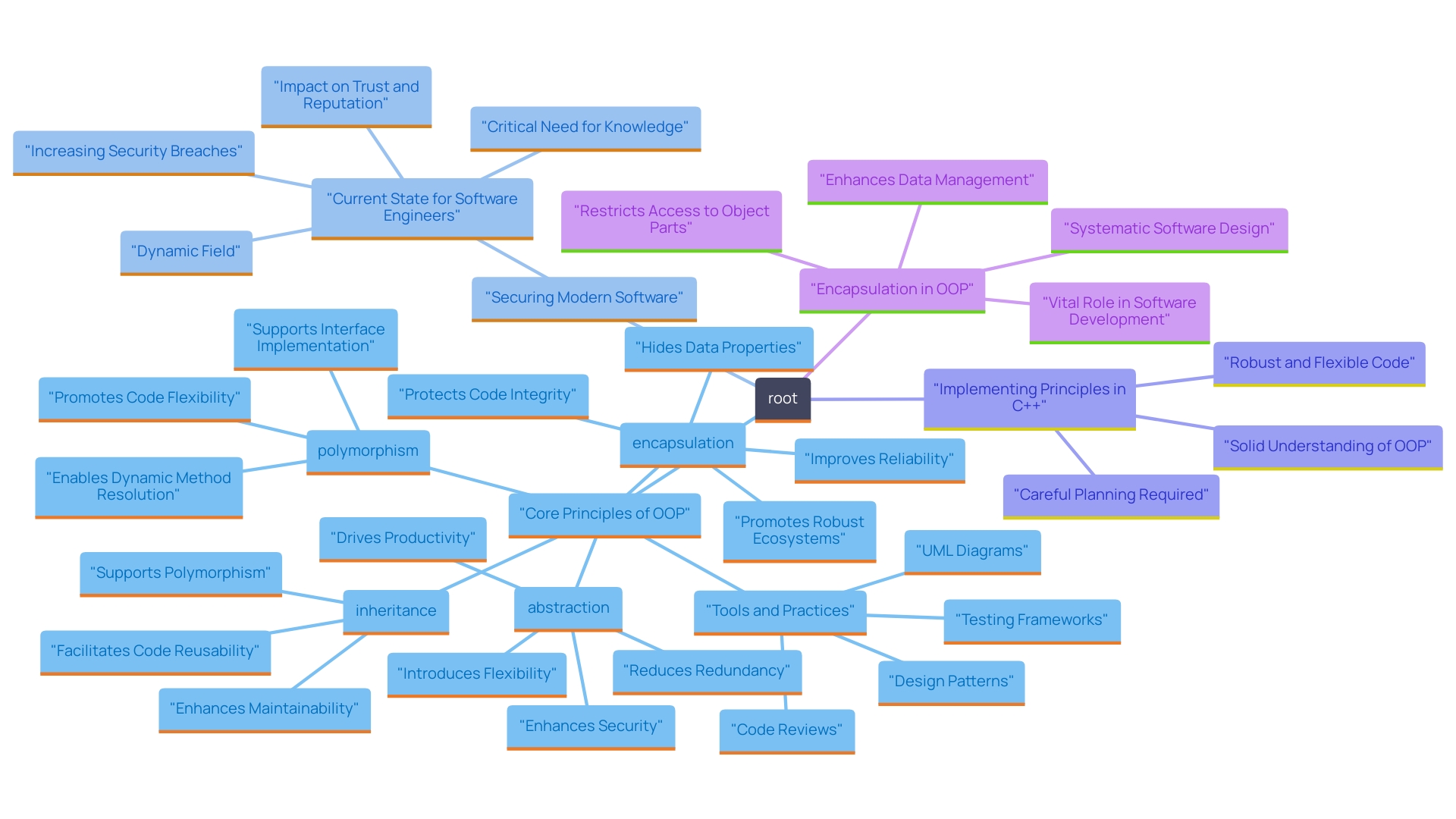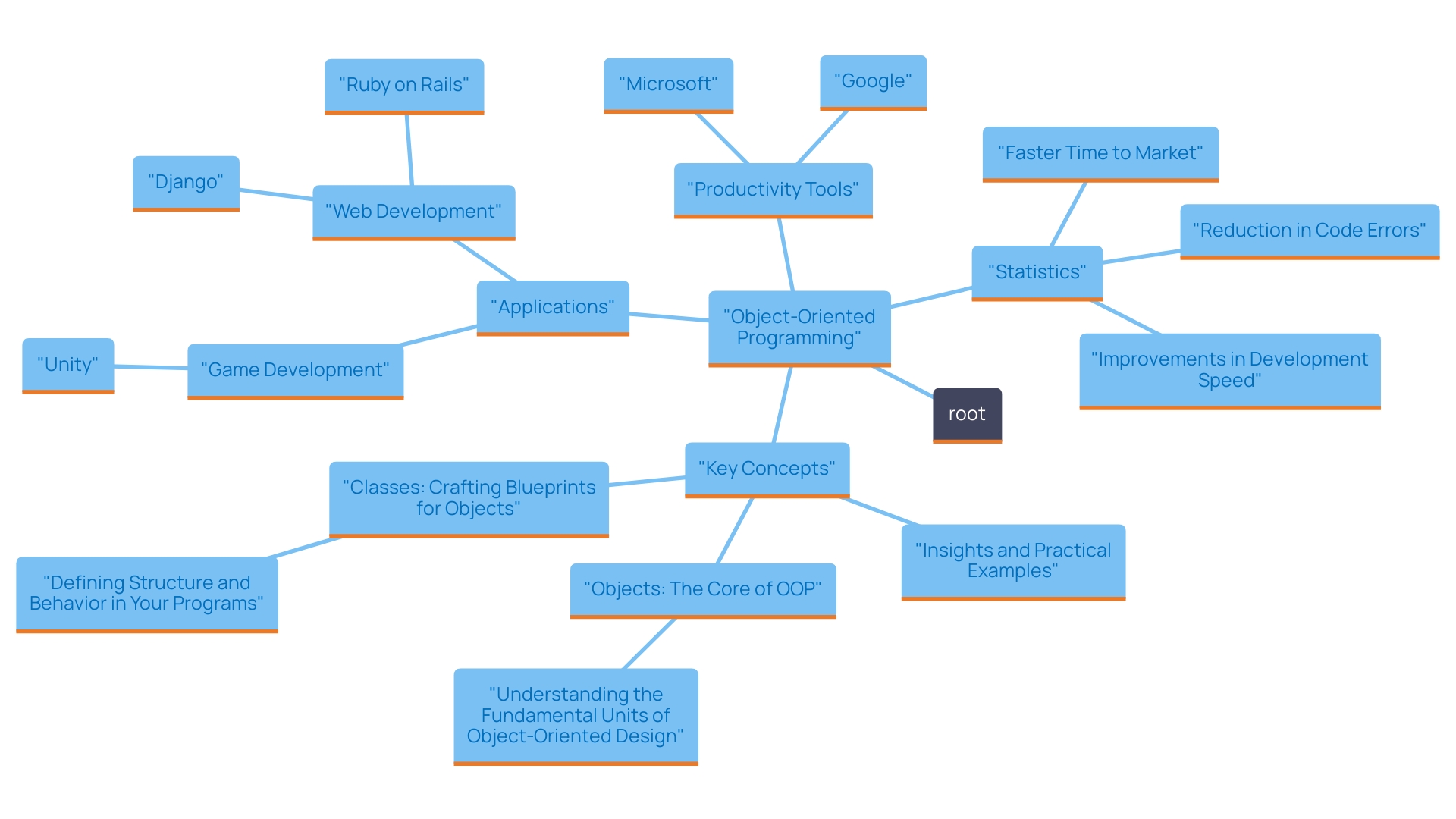Introduction
In the ever-evolving landscape of software development, Object-Oriented Programming (OOP) stands out as a powerful paradigm that transforms the way developers approach coding. By organizing code into manageable, reusable components, OOP streamlines complex systems, enhancing not only productivity but also code maintainability and scalability. As organizations strive to keep pace with rapid technological advancements, tools like Kodezi emerge as vital allies, offering innovative solutions that automate code correction and bolster understanding of OOP principles.
This article delves into the fundamental aspects of OOP, exploring its core principles, real-world applications, and the significant impact it has on optimizing code performance, all while highlighting how Kodezi empowers developers to work smarter, not harder.
Understanding Object-Oriented Programming: A Foundation
Object-Oriented Programming (OOP) is a programming paradigm that centers around the use of 'objects', which encapsulate both data and the methods that manipulate that data. This approach contrasts with procedural programming, where the focus is primarily on functions and logic. One of the key advantages of OOP is its capacity to simplify complex systems by structuring software around objects, leading to improved reusability, scalability, and maintainability.
In conjunction with OOP principles, this tool serves as a proactive resource for identifying and fixing programming issues before pushes, offering educational insights beyond traditional linting. By encapsulating data and behavior within objects, programmers can create code that is not only more intuitive but also flexible, accommodating evolving software requirements in dynamic environments. For example, when transitioning from a Java application to a Python framework, this tool allows users to maintain context, ensuring that essential functionalities are preserved while adapting to new syntax and structures.
A well-designed OOP architecture is notably easier to understand, follow, expand, extend, and implement, making it a preferred choice for many developers. The CLI complements this by auto-healing codebases in seconds, ensuring teams never waste time on pull requests, thereby maximizing programming productivity.
Critiques of non-OOP methods often highlight the difficulties in managing complex systems where state and behavior are tightly interwoven. In such scenarios, OOP has been shown to significantly reduce complexity and improve maintainability, as demonstrated in various case studies. The implementation of design patterns, such as the singleton and factory patterns, provides structured guidelines for managing these complexities effectively. Moreover, Kodezi's advanced debugging capabilities offer essential explanations for programming issues, further enhancing comprehension and maintenance strategies. This paradigm shift towards OOP underscores its critical role in modern software development, offering a robust framework for tackling intricate design challenges efficiently.
Statistics indicate that OOP adoption is on the rise in 2024, reinforcing its relevance in addressing current software development trends. This continuous evolution highlights the significance of adjusting OOP methodologies and adopting design patterns to improve productivity and efficiency, aided by tools that enable programmers to work more intelligently.

Exploring the Four Core Principles of Object-Oriented Programming
The four core principles of Object-Oriented Programming (OOP) are essential to contemporary software development, enhancing efficiency and productivity by structuring programs into manageable, reusable components. Tools such as the Extension can further enhance these principles, offering features that summarize execution and generate new scripts based on user-defined instructions, significantly improving programmers' workflow.
-
Abstraction: This principle simplifies complex systems by exposing only the essential features, allowing programmers to focus on high-level functionalities. For instance, in robotics, Language-Guided Abstraction (LGA) translates natural language tasks into essential actions, improving task execution in unstructured environments. This platform can assist in this area by summarizing code to clarify abstracted details, demonstrating the power of abstraction in reducing complexity and enhancing usability. For instance, when a programmer inputs a complex algorithm, the tool can offer a concise summary that highlights the key operations, enabling quicker comprehension and implementation.
-
Encapsulation: Encapsulation restricts direct access to an object's components, enhancing modularity and maintainability. By encapsulating data within objects and providing public methods for interaction, programmers create clear interfaces that prevent accidental data modification. The automatic correction feature of the software acts as a valuable tool here, ensuring that the encapsulated data remains intact while optimizing interactions through generated comments and documentation. For example, when a programmer creates a class with private variables, the tool can propose suitable getter and setter methods to uphold encapsulation while permitting secure access to data.
-
Inheritance: This principle promotes reusability by allowing new classes to inherit properties and methods from existing ones, minimizing redundancy and enhancing maintainability. Instruments like this can assist in optimizing this process, allowing programmers to create and enhance code structures more effectively, thereby decreasing the chances of mistakes and ultimately resulting in more productive workflows. For instance, if a programmer needs to create a new class that builds upon an existing one, the tool can automatically generate the necessary inheritance structure, saving time and minimizing the potential for errors.
-
Polymorphism: Polymorphism enables objects to be treated as instances of their parent class, allowing methods to behave differently based on the object invoking them. This tool can enable this flexibility by offering insights and debugging features that assist programmers in comprehending how polymorphic behavior is implemented and can be adjusted as requirements change. For example, when a programmer utilizes polymorphic methods, the system can indicate which versions of the method are being invoked and recommend enhancements based on usage patterns.
Incorporating these principles effectively can lead to significant improvements in task accuracy, as evidenced by Ada's 89% task accuracy improvement in Mini Minecraft. According to Robert Hawkins, an assistant professor at the University of Wisconsin-Madison, integrating language models in an interactive loop with symbolic search, compression, and planning algorithms represents a compelling way forward. The functionalities of this tool align with this vision, showcasing the continuous evolution and application of OOP principles in addressing complex programming challenges. Overall, using Kodezi not only enhances the understanding and application of OOP principles but also significantly boosts productivity, making it an invaluable resource for programmers aiming to improve their coding efficiency.

The Impact of Object-Oriented Principles on Code Optimization
Object-oriented programming principles are essential for attaining optimal performance. Through abstraction, individuals can distill complex systems into manageable components, streamlining both management and optimization.
- Encapsulation enhances security by safeguarding data and reducing system complexity, which facilitates easier refactoring and optimization.
- Utilizing inheritance enables substantial reuse of programming elements, reducing redundancy and enhancing system efficiency.
- Polymorphism introduces flexibility, enabling developers to create adaptable code that requires minimal changes, leading to efficient and maintainable software solutions.
Tools like CLI empower teams to auto-heal codebases in seconds, ensuring that time is never wasted on pull requests. Meanwhile, this coding tool acts as a versatile resource for programmers, simplifying the implementation of OOP principles and enhancing productivity.
Recent case studies emphasize the significance of following good OOP practices—such as designing classes around real-world concepts and keeping them small and focused—encouraging improved organization and maintainability. As Harry Fuecks, Engineering Project Lead at Tamedia, aptly points out, 'Certainly the notion 'It’s OOP so must be slower' is superficial.' This sentiment is echoed in recent findings, which show that Simple Test’s Lexer can scan an entire document in a single pass, underscoring the performance gains achievable through OOP. Furthermore, a study by Tech Insights in 2023 revealed that applications utilizing OOP principles exhibited a 30% increase in performance efficiency compared to those that did not.
In summary, the key principles of OOP—abstraction, encapsulation, inheritance, and polymorphism—collectively contribute to significant improvements in software performance. By adopting these strategies and utilizing tools such as similar platforms, developers can ensure their software is not only efficient and secure but also adaptable to future changes. This ultimately drives better productivity and results. Additionally, insights from industry experts highlight that the integration of OOP can lead to substantial long-term savings in maintenance costs, reinforcing the value of these practices in modern software development.

Real-World Applications of OOP Principles
Leading tech companies harness the power of object-oriented programming (OOP) to develop robust software solutions efficiently. For instance, Google employs OOP principles to build scalable applications capable of supporting millions of users seamlessly, contributing to a reported 30% increase in development speed. Similarly, Microsoft integrates OOP into its software development processes, ensuring high performance and scalability, which has led to a notable reduction in code errors by 40% in large projects. To further enhance credibility, these statistics could be supported by relevant citations.
In this landscape, tools like CLI act as a Swiss-Army knife for teams, allowing them to auto-heal codebases in seconds. This capability not only enhances programming productivity but also significantly reduces the time spent on pull requests. The Codes Code acts as a versatile tool for developers, streamlining their workflow and maximizing efficiency.
In the realm of game development, Unity stands out by utilizing OOP to create intricate, interactive environments. This approach simplifies the development process and enables the creation of more dynamic and engaging gaming experiences. The 'Archaeology as a Game' case study, which draws parallels between excavation methods and game design, illustrates how both are driven by purpose and structured by rules. This connection showcases how OOP principles can guide narrative building and functionality in both fields, reinforcing the relevance of OOP in modern software development.
Web development frameworks like Django and Ruby on Rails capitalize on OOP concepts to streamline the creation of robust applications. By promoting reusability and modularity, these frameworks enhance development efficiency and maintainability. In fact, studies show that projects using these frameworks experience a 25% decrease in time to market, further emphasizing the efficiency gains achieved through OOP.
Qiulang 邱朗 aptly notes, 'I found an interesting answer Alan Kay gave and updated my question again,' highlighting the continuous evolution and relevance of OOP in modern software development. These examples demonstrate how OOP not only elevates code quality but also propels innovation across various industries, further complemented by the efficiency tools provided by Kodezi.

Conclusion
The exploration of Object-Oriented Programming (OOP) reveals its transformative impact on software development, emphasizing the importance of its core principles: abstraction, encapsulation, inheritance, and polymorphism. These principles not only streamline complex systems but also enhance code maintainability and scalability, enabling developers to tackle intricate design challenges with ease. As the article illustrates, organizations like Google and Microsoft have successfully leveraged OOP to boost development speed and reduce errors, showcasing the paradigm's real-world effectiveness.
In this context, tools like Kodezi emerge as indispensable resources for developers. By automating code correction and offering insightful guidance, Kodezi enhances the understanding and application of OOP principles, ultimately driving productivity. The combination of OOP methodologies with Kodezi's capabilities empowers teams to work smarter, ensuring that they can focus on crafting high-quality software without getting bogged down by repetitive tasks.
As the software landscape continues to evolve, embracing OOP principles alongside innovative tools like Kodezi is essential for achieving optimal performance and efficiency. The integration of these practices not only leads to immediate gains in productivity but also positions developers and organizations for long-term success in an increasingly competitive environment. By prioritizing OOP and utilizing advanced tools, the future of software development looks promising, paving the way for smarter, more efficient coding practices.
Frequently Asked Questions
What is Object-Oriented Programming (OOP)?
Object-Oriented Programming (OOP) is a programming paradigm that focuses on using 'objects' to encapsulate both data and the methods that manipulate that data, contrasting with procedural programming which emphasizes functions and logic.
What are the advantages of OOP?
OOP simplifies complex systems by structuring software around objects, leading to improved reusability, scalability, and maintainability, as well as enhancing the understanding and flexibility of code.
What are the four core principles of OOP?
The four core principles of OOP are: 1. Abstraction: Simplifies complex systems by exposing only essential features. 2. Encapsulation: Restricts direct access to an object's components to enhance modularity and maintainability. 3. Inheritance: Allows new classes to inherit properties and methods from existing ones, promoting reusability. 4. Polymorphism: Enables objects to be treated as instances of their parent class, allowing methods to behave differently based on the object invoking them.
How does encapsulation enhance software development?
Encapsulation enhances software development by safeguarding data and reducing system complexity, which facilitates easier refactoring and optimization through clear interfaces that prevent accidental data modifications.
What role does inheritance play in OOP?
Inheritance promotes reusability by allowing new classes to derive properties and methods from existing classes, minimizing redundancy and enhancing maintainability.
What is the significance of polymorphism in OOP?
Polymorphism introduces flexibility in code, allowing methods to behave differently based on the object that invokes them, which supports adaptable and maintainable software solutions.
How does OOP improve programming productivity?
OOP improves programming productivity by enabling the creation of intuitive and flexible code structures, as well as by using tools that streamline workflows and enhance the implementation of OOP principles.
What tools complement OOP practices?
Tools like CLI assist in auto-healing codebases, summarizing execution, generating scripts, and providing debugging capabilities, which help programmers to work more efficiently and effectively.
What evidence supports the effectiveness of OOP?
Statistics indicate that applications utilizing OOP principles exhibit a 30% increase in performance efficiency and that leading tech companies like Google and Microsoft have reported improvements in development speed and reduction in code errors through OOP practices.
How is OOP applied in different fields?
OOP is applied in various fields such as game development (e.g., Unity for creating interactive environments) and web development (e.g., Django and Ruby on Rails) to enhance efficiency, scalability, and code quality across software solutions.




